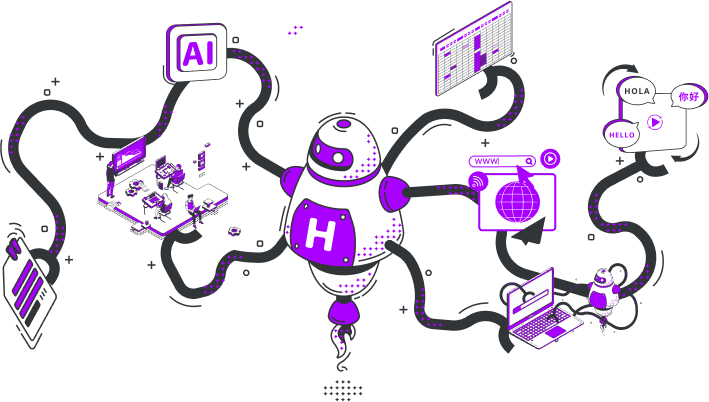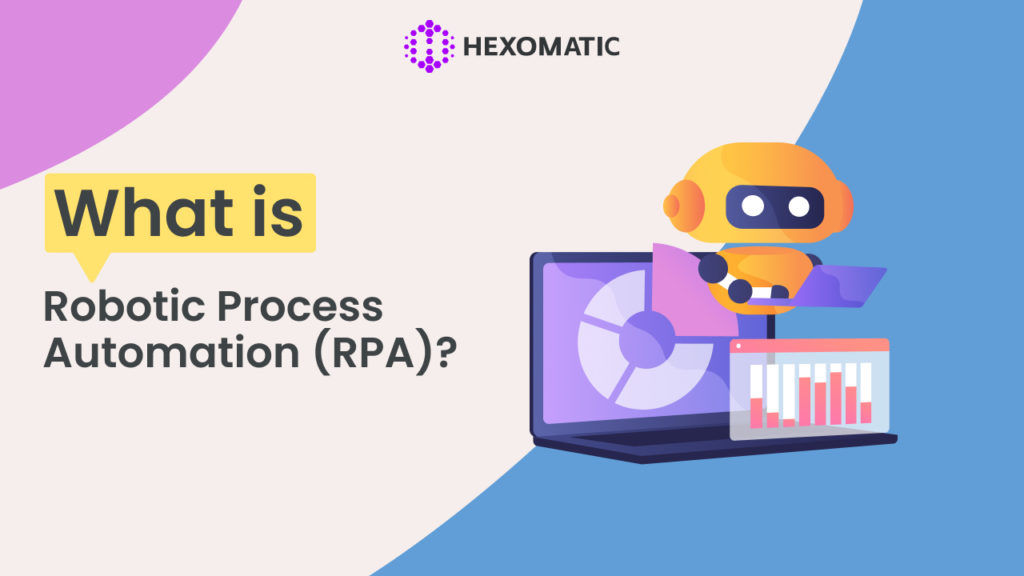Robotic process automation, also known as software robotics, is a software technology that utilizes automation technologies to mimic certain types of tasks, such as gathering data from different platforms and websites, downloading files in bulk, filling in forms, etc.
This technology combines APIs and user interfaces to complete repetitive tasks. By using scripts, RPA tools perform various activities and transactions across unrelated software systems. This type of automation allows businesses to complete certain tasks at speed and high quality, freeing up employee time for more complex or creative tasks. Thanks to this technology, decision-makers increase their ROI rates.
How does RPA work?
Most RPA tools incorporate the following main elements:
- – Low-code capabilities to create automation scripts
- – Integration with enterprise applications
- – Configuration
- – Security
- – Front-end applications
Thanks to these elements, RPA tools behave like humans and perform repetitive tasks. such as visiting and copy-pasting information from one system to another.
What are the main benefits of Robotic process automation?
Implementing Robotic process automation to your processes has multiple benefits. Here are some for you to consider:
Less coding: The great thing about RPA tools is that they can be used by anyone, without having to ask a developer for configuration. Almost all RPA tools have drag-and-drop features, making it easier to onboard your non-tech-savvy team.
Rapid cost-savings: RPA tools are used to reduce the workload of teams. Employees can focus on other priority tasks, thus increasing productivity and ROI.
Customer satisfaction: Chatbots can work 24 hours a day, which means your customers will get faster replies and reduced wait times, which will lead to higher rates of customer satisfaction.
Creativity: As your team stops working on repetitive tasks, they will have more time for more creativity. This kind of change will only have a positive impact on your staff.
Accuracy: By using RPA tools, you will reduce human errors, increasing the accuracy of your completed tasks.
Robotic process automation use cases
RPA tools are utilized in various industries to streamline their business processes. Here are the main industries where you can find RPA implementations:
Banking and financial services: Nowadays, all the major banks are using RPA automation solutions to automate different tasks, such as fraud and protection, anti-money laundering, customer research, account opening, and many more. Banks have started automating all the repetitive tasks related to manual data entry.
Insurance: This industry also is full of repetitive tasks that are automated with the help of RPA tools.
Retail: RPA tools have become an inseparable part of this industry with the help of which businesses carry out tasks such as customer relationship management, order management, customer feedback processing, and fraud detection and protection.
Healthcare: The largest hospitals implement RPA software to complete activities, such as information management, payment cycles, prescription management, reporting, analytics, and more.
How to choose the right RPA tool?
When choosing an RPA tool, you should consider the following factors:
Scalability: Businesses usually choose RPA software or a tool that allows them to manage the activities from a central control panel.
Speed: The selected RPA tools should allow businesses to increase their task completion time. If your employee usually gathers the required data in a week, you should get it in just a few minutes with the help of RPA.
Simplicity: Companies should choose a tool that can easily be implemented by non-tech-savvy employees. The tool should be simple, with a user-friendly interface. Make sure that all the employees can use the selected tool in order to complete tasks, such as data collection and analysis.
Reliability: As your employees will use the selected tool often to automate hundreds of tasks, you should choose a tool that is reliable and safe to use.
How can Hexomatic help you automate your tasks?
As you can see, Robotic process automation is used in industries that include repetitive tasks, such as banking, insurance, healthcare, retail, marketing, etc.
Hexomatic is one of the best RPA tools that can be used to automate tasks in all possible industries. Thanks to its 100+ automations presented on the website, you can gather valuable data by following the simple steps mentioned for each automation.

Like other RPA tools, Hexomatic doesn’t require any coding skills. All you have to do is choose the automation you need and complete the steps to automate your workflows!
For instance, if you are a marketing agency, you can save your time and resources by automating tasks, such as carrying out competitor research, content analysis, lead generation, SEO-related tasks, grammar checking, extraction of social links, phone numbers, emails, blog articles, etc.
To analyze competitors’ products, you can use Hexomatic automations, such as Amazon product data collection, product review extraction, Bing search, Google Maps and News data extraction, and many more.
You can even create your own ChatGPT agent and use custom prompts to complete various tasks based on your scraped data!
Simply browse the automations and you’ll find the ones you need to automate your repetitive tasks!
Automate & scale time-consuming tasks like never before


Content Writer | Marketing Specialist
Experienced in writing SaaS and marketing content, helps customers to easily perform web scrapings, automate time-consuming tasks and be informed about latest tech trends with step-by-step tutorials and insider articles.
Follow me on Linkedin
